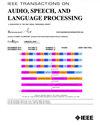Machine Learning Paradigms for Speech Recognition: An Overview
IEEE Transactions on Audio Speech and Language Processing
Pub Date : 2013-05-01
DOI:10.1109/TASL.2013.2244083
引用次数: 350
Abstract
Automatic Speech Recognition (ASR) has historically been a driving force behind many machine learning (ML) techniques, including the ubiquitously used hidden Markov model, discriminative learning, structured sequence learning, Bayesian learning, and adaptive learning. Moreover, ML can and occasionally does use ASR as a large-scale, realistic application to rigorously test the effectiveness of a given technique, and to inspire new problems arising from the inherently sequential and dynamic nature of speech. On the other hand, even though ASR is available commercially for some applications, it is largely an unsolved problem - for almost all applications, the performance of ASR is not on par with human performance. New insight from modern ML methodology shows great promise to advance the state-of-the-art in ASR technology. This overview article provides readers with an overview of modern ML techniques as utilized in the current and as relevant to future ASR research and systems. The intent is to foster further cross-pollination between the ML and ASR communities than has occurred in the past. The article is organized according to the major ML paradigms that are either popular already or have potential for making significant contributions to ASR technology. The paradigms presented and elaborated in this overview include: generative and discriminative learning; supervised, unsupervised, semi-supervised, and active learning; adaptive and multi-task learning; and Bayesian learning. These learning paradigms are motivated and discussed in the context of ASR technology and applications. We finally present and analyze recent developments of deep learning and learning with sparse representations, focusing on their direct relevance to advancing ASR technology.语音识别的机器学习范式:概述
自动语音识别(ASR)一直是许多机器学习(ML)技术背后的驱动力,包括普遍使用的隐马尔可夫模型、判别学习、结构化序列学习、贝叶斯学习和自适应学习。此外,机器学习可以并且偶尔会将ASR作为一个大规模的、现实的应用程序来严格测试给定技术的有效性,并激发由语音固有的顺序和动态特性引起的新问题。另一方面,尽管ASR在某些应用中已经商业化,但它在很大程度上是一个未解决的问题——对于几乎所有的应用,ASR的性能都不能与人类的性能相提并论。来自现代机器学习方法论的新见解显示了推动ASR技术发展的巨大希望。这篇综述文章为读者提供了现代机器学习技术的概述,这些技术在当前和未来的ASR研究和系统中得到了应用。其目的是促进ML和ASR社区之间的进一步交叉授粉,而不是过去发生的。本文是根据主要的ML范例组织的,这些范例要么已经流行,要么有潜力对ASR技术做出重大贡献。本综述中提出和阐述的范式包括:生成性学习和辨别性学习;有监督、无监督、半监督和主动学习;自适应和多任务学习;和贝叶斯学习。这些学习范式是在ASR技术和应用的背景下被激发和讨论的。最后,我们介绍并分析了深度学习和稀疏表示学习的最新发展,重点关注它们与推进ASR技术的直接相关性。
本文章由计算机程序翻译,如有差异,请以英文原文为准。
求助全文
约1分钟内获得全文
求助全文
来源期刊
自引率
0.00%
发文量
0
审稿时长
24.0 months
期刊介绍:
The IEEE Transactions on Audio, Speech and Language Processing covers the sciences, technologies and applications relating to the analysis, coding, enhancement, recognition and synthesis of audio, music, speech and language. In particular, audio processing also covers auditory modeling, acoustic modeling and source separation. Speech processing also covers speech production and perception, adaptation, lexical modeling and speaker recognition. Language processing also covers spoken language understanding, translation, summarization, mining, general language modeling, as well as spoken dialog systems.

 求助内容:
求助内容: 应助结果提醒方式:
应助结果提醒方式:


